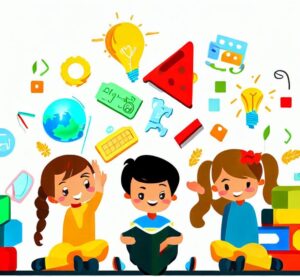In the intricate process of child development, language skills hold a pivotal role. They form the building blocks of communication, allowing children to express themselves, interact with others, and make sense of the world around them. With the mastering of language, a child embarks on a lifelong journey of learning, understanding, and connecting.
Language Skills refer to the ability to understand spoken and written language, while expressing oneself accurately and fluidly. Child Development, on the other hand, entails the growth and maturation process in children across various domains, including cognitive, social-emotional, and educational aspects.
The Role of Language in Cognitive Development
Language is often described as the engine that drives cognitive development in children. This is because language enables children to express their thoughts, process complex ideas and form logical connections between different concepts. Let’s delve deeper into three critical areas of language skills – syntax, vocabulary, and comprehension.

- Syntax: this refers to the structure and rules governing the placement of words in sentences. As children mature, so does their understanding of syntax, allowing them to form more complex sentences. The ability to understand and apply syntax helps children to follow instructions, engage in meaningful conversations and express their thoughts clearly. As they develop their syntax skills, they increase their capacity for logical thinking and problem solving.
- Vocabulary: expanding vocabulary is more than just learning new words. Each new word a child learns opens up a novel concept or idea, broadening their knowledge of the world. A rich vocabulary allows children to better communicate their thoughts and understand the thoughts of others. Vocabulary development also strengthens cognitive skills like memory, as remembering words and their meanings is a cognitive exercise itself.
- Comprehension: this is the ability to understand spoken and written language, grasp the meaning of words, sentences, and texts, and interpret or infer information. Good comprehension skills allow children to make sense of the world around them. As children’s comprehension develops, they become better at problem solving, decision making, and critical thinking.
Research conducted by the National Institute of Child Health and Human Development provides clear evidence of this connection between language and cognition. The study found a strong correlation between a child’s language skills and their performance on tasks that measure intelligence, attention, and memory. Specifically, children with a strong command over language skills performed distinctively better in these tasks compared to their peers with lesser proficiency.
This further highlights the profound impact of language skills not just on the cognitive development of a child, but their overall intellectual growth. Ensuring children are provided with rich language experiences from their early years sets a strong foundation for their cognitive development, thereby shaping their future learning experiences. Through language, children are empowered to become thinkers, problem solvers, and lifelong learners.
The Role of Language in Social-emotional Development
Language acts as the bridge that connects children to their social and emotional selves, and to the world around them. Through language, children learn to communicate their feelings, ideas, and needs, and understand those of others. Let’s dive into the specific ways that language skills influence social-emotional development.
Language forms an integral part of emotional literacy. It provides necessary linguistic tools for children to accurately express their feelings and experiences. Expressing emotions verbally assists children in identifying and understanding their emotional states. This empowers them with the ability to cope with emotional distress and navigate emotional experiences effectively.
Beyond expressing their feelings, language aids children in recognizing and understanding the emotions of others. This receptive use of language plays a crucial role in developing empathy. Empathy, the ability to understand and share the feelings of others, forms the foundation of meaningful social interactions. This ability to ‘put themselves in another’s shoes’ helps kids establish and maintain social relationships.
The ability to communicate emotions and understand those of others significantly impacts relationships. By effectively articulating thoughts and feelings, children are more equipped to resolve conflicts and misunderstandings. This can lead to stronger friendships and more positive interactions with peers and adults alike.
Children with limited language skills often face hurdles in their social-emotional development. Without the ability to express their emotions accurately, they may feel misunderstood and frustrated. This can lead to social isolation, as peers may struggle to connect with them. Facing these social difficulties can have adverse impacts on their emotional well-being and self-esteem.
Fostering robust language skills from early childhood is crucial for healthy social-emotional development. Language facilitates emotional understanding and expression, cultivates empathy, and offers a profound impact on relational dynamics. As society becomes increasingly interdependent, these social-emotional skills gained via language learning become invaluable assets for individuals navigating multifaceted social landscapes.
The Role of Language in Educational Development

Language skills are fundamental for educational development. They allow children to effectively understand instructions, partake in classroom discussions, and enhance their reading and writing abilities. Moreover, strong language skills contribute to improved academic performance, given their intimate link to literacy skills.
According to a study published in the Journal of Educational Psychology, students with strong language skills in their early school years are more likely to have better academic performance later on.
Strategies to Enhance Language Skills in Children
Encouraging language development in children requires a conscious effort from parents and educators alike. Reading to children regularly, engaging them in conversation, using interactive games to enhance vocabulary, and exposure to diverse language environments can prove incredibly beneficial.
Parents can create a stimulating language environment at home by narrating everyday activities, singing songs, or telling stories. For educators, incorporating interactive language activities and encouraging classroom discussions can enhance students’ language skills.
Language skills play a crucial role in the holistic development of children, extending well beyond the realms of communication. They pave the way for cognitive growth, social-emotional understanding, and educational success, painting a broader canvas of opportunities for each child.
As educator Rita Pierson aptly put it, “Every child deserves a champion – an adult who will never give up on them…and insists they become the best that they can possibly be.” Our commitment to fostering language skills in the young minds around us contributes significantly towards molding them into the best version of themselves.

